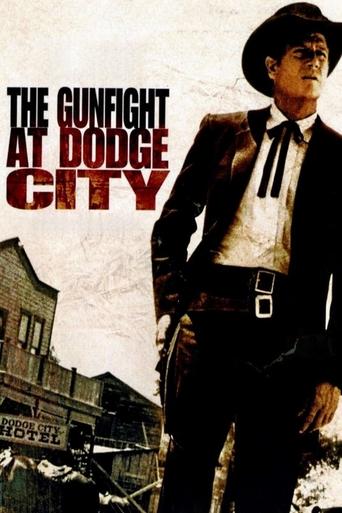zardoz-13
"Virginian" star Joel McCrea displays his virile charisma as legendary frontier lawman 'Bat' Masterson in "Fort Massacre" director Joseph M. Newman's an above-average but often predictable "The Gunfight in Dodge City," that Walter Mirisch produced a couple of years after John Sturges' superlative shoot'em up "Gunfight at the O.K. Corral with Burt Lancaster and Kirk Douglas. Mind you, "Gunfight at the O.K. Corral" was casual about its fidelity to facts, and "Two Guns and a Badge" scenarist Daniel B. Ullman and "Fort Massacre" scribe Martin Goldsmith are just as guilty. Indeed, Dodge City, Kansas, existed, and there was a 'Bat' Masterson as well as an Ed Masterson. However, Ullman and Goldsmith have altered the circumstances around Ed's unfortunate demise to stimulate conflict on our hero's motivation to eliminate the culpable adversaries. The production values are better-than-average, and the cast features several familiar faces, even those lurking on the periphery. Look for Robert Mitchum's younger brother John, for example, as a boisterous cowboy eager to whoop it up. Aside from seasoned western veteran Joel McCrea, the cast includes John McIntire, Richard Anderson, James Westerfield, Walter Coy, Don Haggerty, and the always dependable Harry Lauter as Ed Masterson. Basically, aside from the general facts, "The Gunfight at Dodge City" amounts to a dusty, standard-issue horse opera about the taming a wild cattle town and the evils of killing. Newman confines the action to a trim 81, so neither it nor he wear out their welcome. "Shoot-Out at Medicine Bend" lenser Carl E. Guthrie deploys his Cinemascope lens for the best effect, and this western looks better than it deserves. Western aficionados will notice that our hero is caught between the two typical women--the saloon girl and a preacher's daughters--and the outcome clashes with what usually occurs in a western. If you enjoy westerns, you'll find that Newman handles with clichés with competence.
Robert J. Maxwell
Average inexpensive Western.Joel McCrae is Bat Masterson, saloon owner and now sheriff, newly elected to put an end to the cowboys who come to town on weekends to hoorah the place and frighten the dickens out of the good folk, like Doc John McIntire and Julie Adams, the purty preacher's daughter.It resembles so many other routine Westerns of the period that they're all jumbled together in my head so I think I'll skip the details of the plot. They're not important anyway. You'll have no trouble distinguishing the good guys from the bad guys after the first few minutes. This isn't the kind of movie that humanizes either the hero or his enemies. Ambiguity? Streng Verboten! As for that titular "shoot out", McCrae has just been "called out" by his evil rival for the sheriff's office. Julie Adams begs him not to go. "I don't want to go," he replies, "but I've got to. That's the difference between an animal and a man." Something like that anyhow. Maybe it was, "A man's gotta do what a man's gotta do," or, "Some things a man can't ride around." He confesses to being scared but I don't know why. The two rivals walk towards each other down the dusty and deserted street. "You call it," one of them says. And BANG and you-know-who is lying on the ground. It's all over with in about two minutes.The real Bat Masterson had nothing to be afraid of. Maybe he didn't wind up with the breathtaking Julie Adams under the same blanket, which is too bad for him, but he did act, I think, as Time Keeper at some heavyweight championship boxing match, didn't he? I believe there is a photo of him at ringside. He's wearing a derby.Joel McCrae didn't do badly either. He made his exit after a splendid early Pekinpah movie and spent his adult life married to the estimable Frances Dee. He seemed like a nice guy too and deserved his decent career.
Patricia Hammond
I enjoyed this. It provides everything one expects from a Western: good plot, revenge, love, conflict between law and personal conscience, plenty of gun-play, and mood. And a few excellent quotes. Try: "The distance between here and that street is the distance between a rabbit and a man." The beginning is refreshing too. Before the title and opening credits, a world-weary McCrea is telling a simple teenage boy who admires his prowess with a gun what it really is like. How scared one is, how little it has to do with heroics, and how awfully wretched one feels afterwards. In this film, the gunfights are fast, and mostly in the dark. That's probably more accurate than so many more overblown sequences in other films. The performances on everyone's part, even the baddies', are in many ways unexpectedly subtle. Take Regan, the bad Sheriff. Look at his strange, tormented eyes. None of it's overplayed. If it's raining outside, get out the popcorn and curl up with this.
alexandre michel liberman (tmwest)
Somehow this western did not come out right. It is not the fault of the actors, McCrea is as good as always and Julie Adams is better than in any film I have seen her. No problem with the story either. I did not like the action scenes, except when there is a fistfight between McCrea and Don Haggerty. The shootouts were too quick, no strategy whatsoever,and not dramatic enough. The director can be blamed for that. Comparing this film with "Colorado Territory" made in 1949, a great western with McCrea you get to the conclusion that instead of evolving, in some cases the westerns regressed. This was to be the final film made by McCrea in his career. Good thing, Peckinpah saved him from this sad goodbye.




